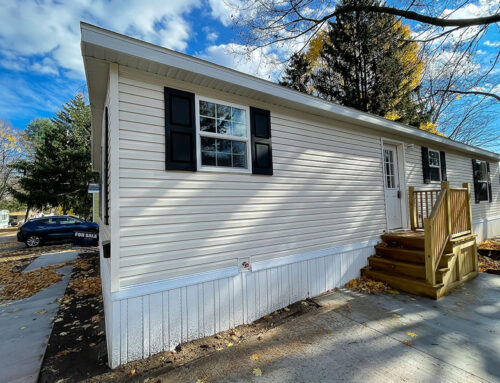I was born and raised just outside of Philadelphia, in Warminster. So, when I returned to the states after a couple of tours overseas to embark on a new career path, I knew I wanted to be living and working close to home. What I didn’t know at the time was that I would turn to investing in Pennsylvania real estate. It was work I just kind of fell into when my former army buddy, Jake, asked if I wanted to go in on a downtown rental property with him. But, from then on, I was hooked on investing—though not necessarily on buy-and-holds. The realities of being a landlord in PA were tougher than I expected. The experience didn’t stop me from investing. But, it did prompt me to change my strategy.
The Pros and Cons of Being a Landlord in PA
When you have no formal training or experience investing in real estate, buying that first investment property to renovate and rent out seems like a simple foray into the field. It’s even recommended online and in books, and by other investors who’ve done quite well for themselves in the rental market. But, not everything is as it seems and, unfortunately, you don’t always know what you’re really getting into until you arrive. So, before you rush forward to buy a rental property, let me spell out what you can realistically expect. As with every new operation, there are pros and there are cons.
The Benefits of Holding Pennsylvania Rentals
The benefits of being a landlord are considerable and hard to argue against. They’re why so many new investors buy and hold their first investment property and why some of my more seasoned colleagues hang onto theirs for years. Consider the following:
- You can receive passive income. If you can easily clear your loan, tax, and insurance payments, in addition to any maintenance and marketing expenses, with the rent a tenant pays and have cash left over, that money is yours. Passive income is probably the number one reason to buy and hold properties. Even in markets where the rents are falling, like in Northern Liberties, you can still potentially see this benefit provided you bought low and can keep your holdings costs even lower.
- You might qualify for tax deductions. Though property taxes in Pennsylvania aren’t the highest in the nation, in some areas, like Lower Merion, they’ve jumped a staggering 45% in the last decade. But there are several investment property tax deductions that you may be able to qualify for. The interest you pay on your loan, the cost to upgrade and maintain the units, any expenses associated with advertising, even travel expenditures and legal fees may be deducted at the year’s end. It’s also possible to get an annual depreciation deduction as well. This is good to keep in mind, and better to discuss with your accountant, since you’ll want to take advantage of any opportunity to put some green back in your pocket—assuming the new limits on federal tax deductions don’t hinder you.
- Your property may appreciate over time. Unlike the stock market, the real estate market is fairly stable as properties generally appreciate over time. How much or how little can vary between regions, even towns. But, it’s not unreasonable to expect that when you decide to sell your investment property that you’ll be able to realize a potentially decent return. Should the market take a big dip while the rental is still yours, you can simply wait it out. And, if you’re investing in cities like Pittsburgh, where the pre-crash boom wasn’t big enough to incite a large bust, you might not be waiting long.
The Challenges of Being a Landlord in Pennsylvania
While there are legitimate benefits to being a landlord, the cons are convincing and should not be taken with a grain of salt. They’re why a lot of rookie investors give up early on their real estate investing careers and why a lot of old hats, like myself, turn to different strategies and soldier on. Think these over:
- You will have tenant problems. No matter how hard you work to go above and beyond what’s required by Pennsylvania’s landlord-tenant laws, you will have issues with at least some of your renters. Problem tenants are part and parcel of owning rental property. They sometimes pay the rent late, are unable—or refuse—to pay the rent at all, destroy property, and become a nuisance to their neighbors. The actions you can and can’t take against a problem tenant are detailed in the state’s statutes, so it’s not a bad idea to familiarize yourself with what the law allows—or to get a real estate attorney on retainer. Tenants who feel they’ve been harassed can certainly lawyer up themselves and file suit against you with Pennsylvania’s Justice Court, even if, technically, they’re the problem. So, stay on the right side of the law while still being prepared for things that could go wrong.
- You will have holding costs. Whether or not you have a renter in your property, you’ll be responsible for handling a variety of expenses associated with owning the property. These holding costs include your mortgage and renovation loans, property taxes, utilities, and your real estate investor insurance policy payments. If your property is in an area like Allentown, where the rent-to-income ratio makes it difficult for renters to make ends meet, you could have trouble even finding a tenant who can pay. And, being in the middle of evicting a tenant for not paying doesn’t qualify you for a reprieve. Vacancies for any length of time or for any reason can get expensive. They can get so costly, in fact, that it’s possible to fall behind on your own obligations and end up getting foreclosed on or having to sell at a loss.
- Your property will require ongoing maintenance. The longer you hold your property, the more work you’ll have to perform on it. And, as with most states, Pennsylvania’s Warranty of Habitability stipulates that, at minimum, the unit must be safe and sanitary. So, it’s critical that you stay on top of heating and cooling issues, plumbing problems, electrical concerns, gas leaks, and structural damage—just to name a few of the items the Pennsylvania Supreme Court takes very seriously. If you want good tenants, though, you’re going to have to treat the property with great care year round, not just when something serious arises. Everything from an aging dishwasher to a backyard pool will need maintenance every now and then and, take it from me, fixing things can be a full-time job.
When it comes down to it, in my opinion, the benefits you might reap from being a landlord don’t eclipse the challenges you will surely face. Personally, I prefer having more control over my work, and the rewards it produces, than buying and holding property provides. That’s why after I bought and, finally, sold my first rental I started flipping houses in Pennsylvania. Being able to buy, rehab, and sell houses within three to nine months, then turn around and do it again, allows me to realize potential returns faster, more often, and with better accuracy. And, having the best tools and team right there with me helps me reach my investment targets even easier.
How to Best Benefit from Buying, Rehabbing, and Selling Houses
When Jake and I were in the throes of evicting two problem tenants, I met an independently owned and operated HomeVestors® franchisee who bought, sold, and renovated houses for a living. He seemed a lot happier than either me or my buddy, and I wanted what he had. Unfortunately for Jake, he was burned out by being a landlord and had already decided to move on to something new as soon as we could sell. I, on the other hand, was ready to keep charging forward—with a new strategy and a new team.
And, as soon as I became a HomeVestors® franchisee myself, the benefits of joining the “We Buy Ugly Houses®” team were clear. The marketing tools and resources that I gained immediate access to continue bringing me distressed homeowners who need to sell their properties fast. So, I’ve never had to scramble to find good leads. The professional support I get from my network of regional HomeVestors® franchisees and my Development Agent help me make smart investment decisions, too. That kind of backup is something I’m used to and if you’re thinking about becoming a successful real estate investor, I’m sure you could get used to it as well.
Contact HomeVestors® to see how you can benefit from buying, rehabbing, and selling—not just renting—houses with some of the best-qualified leads and support today!
Each franchise office is independently owned and operated.
Contact
"*" indicates required fields





